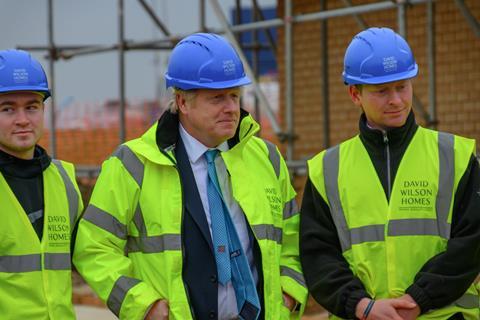Boris Johnson’s election victory was as much of a landslide in tectonic terms as political. Britain’s regional red and blue plates have not so much slid as flipped and the aftershocks could reverberate across the property market for years to come.

Early surveys and a swathe of anecdotal comments point to a sharp pick-up in business and consumer confidence once it became clear that more than three years of parliamentary deadlock were over. It wasn’t the threat of Brexit that was to blame for investment stasis; it was the interminable, stultifying indecision, which instantly evaporated with the first exit poll.
An Institute of Directors survey published 10 days after the election showed the most confident outlook for more than three years. The poll of almost 1,000 members showed a net 21% were confident in the economy compared with -19% only a month earlier – the biggest one-month swing ever registered by the bosses’ organisation. Importantly for property, there was also a sharp rise in investment expectations.
Similar forward-looking optimism glinted through a morass of retrospective gloom in the UK Construction Purchasing Managers’ Index: housing, commercial and civil engineering workloads all fell in December, but optimism for the year ahead rebounded to a nine-month high.
The Halifax House Price Index was up 1.7%, the highest monthly increase since mid-2018. Savills’ 13 January trading statement suggests property markets performed something of a handbrake turn after the election. After “significant challenges” posed by political uncertainty, which had “suppressed market activity in both [sectors] until mid-December”, the “clear outcome of the election prompted a strong close to the year as confidence to transact returned”. Savills’ statement had a London-centric element (for a few months I’ve suggested a revival in at least housing transactions in the capital).

But the election’s standout feature was the redrawing of the political map, which could have long-reaching implications for the economic balance of power and property.
On the morning after the ballot, Boris stressed that voters in traditional Labour heartlands of the north and West Midlands had merely “lent” their pencil crosses. To ensure they return in five years, the government will have to be seen to invest not just in large-scale infrastructure (such as HS2, which I’m convinced will go ahead, as well as ‘Crossrail for the north’), but also in new housing – ultimately much closer to people’s hearts, and quicker to deliver.
A key test will be what is delivered in the 11 March Budget and if there are any changes in emphasis in the likely cabinet reshuffle soon after ‘Brexit Day’ on 31 January. My hunch is that there will be a less stridently pro-private emphasis on tenure than new housing minister Esther McVey broadcast at Property Week’s RESI 2019 (not entirely ‘on message’, civil servants suggested to me).
The interminable, stultifying indecision evaporated with the first exit poll
Policy has oscillated between David Cameron (overwhelmingly pro-private) and Theresa May (tenure-neutral) and apparently back again with McVey. I expect a partial shift back to a more pragmatic policy to improve housing delivery and standards in the regions.
Boris’s ‘One Nation’ mantra is also likely to push Scotland and Northern Ireland up the political agenda, to fend off calls for a separation from the UK. Greater autonomy could be offered north of the border along with an increased focus on the country’s investment in affordable housing.
Northern Ireland could be interesting in a wider economic and industrial context. It could have the unique position in the UK of having a foot in both Britain and the EU. This could attract considerable private sector investment in manufacturing and distribution – injecting a new lease of life into asset prices including housing, where prices have become the fastest growing in the UK, albeit from a low base.
This would probably require the DUP to realise the opportunities as well as perceived threats. Despite having fallen out with his one-time parliamentary partners, if anyone can persuade them, it is probably the silver-tongued Boris Johnson.
Alastair Stewart is an equities analyst and consultant





























No comments yet